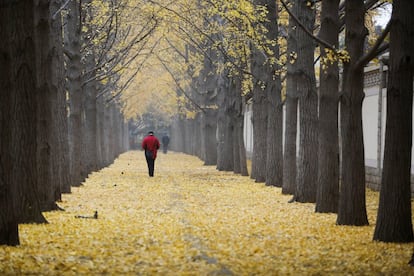Green spaces for everyone, everywhere
In many places, disadvantaged communities continue to be excluded from the planning, design and management of urban forests. And this has to change

A few years ago, a university professor came up with the “3-30-300″ rule. It envisions a world where everyone can see at least three trees from their window, live in a neighborhood with at least 30 percent tree cover, and be no more than 300 meters away from high-quality urban green spaces.
With two thirds of the world population projected to live in urban areas by 2050, this rule is not just about making cities greener because of the many benefits trees and green spaces bring. It is also, crucially, about making sure everyone in cities feels those benefits.
We know that trees and green spaces, otherwise known as urban or peri-urban forests, help mitigate many of the drawbacks of living in urban areas. They buffer noise and filter pollutants from traffic and industry, thus helping to shield against respiratory disease. They provide space for exercise, recreation, and recovery from stress. Evidence of the mental health benefits from contact with forests and green areas is already well documented. Urban forests also ease the effects of climate change. With global temperatures on the rise, urban forests not only absorb carbon, they can help cool city air by up to 8 degrees Celsius and reduce the urban heat island effect — which can be lethal during heat waves. They can even offer protection against natural disasters such as floods and landslides. The need for equal access to urban green spaces is recognized by the UN’s Sustainable Development Goals, which include a specific target to provide universal access to safe, inclusive and accessible green and public spaces, in particular for women, children, people with disabilities and the elderly by 2030. However, a new study published by the Food and Agriculture Organization of the United Nations (FAO) this week reveals that we are still some way off urban populations benefiting from city forests and green spaces equitably.
Urban forests: a global perspective finds that, particularly in low- and middle-income countries, rapid urbanization without sufficient planning often leads to cities with either few or poorly placed trees and green spaces. Even in cities that do recognize the importance of green spaces as part of their urban fabric, the distribution of these spaces and their benefits is often skewed towards wealthier districts. So-called ‘green gentrification’ can further reduce access for residents no longer able to afford to live near their city’s green spaces.
In many places, disadvantaged communities continue to be excluded from the planning, design, and management of urban green spaces. And this must change. That’s why this week participants at the Second World Forum on Urban Forests meeting in Washington, D.C., issued the Washington Declaration, which offers a blueprint for how urban greening can be more equitable. This includes analyzing urban areas to identify imbalances in the distribution of green spaces and engaging residents and community leaders in every stage of the planning process.
While a world populated with urban utopias may be some way away, there are programs and initiatives which suggest various planning authorities are thinking more inclusively when it comes to equal access to urban forests and the bounties they offer.
Worldwide, governments are committing more funds to urban greening programs. For example, the city of Maringá in southern Brazil is planting trees in the most disadvantaged parts of the city’s periphery to help provide better air quality and shade for its citizens during the hot and muggy tropical summers. In China, the Guangzhou municipal government aims to construct 4500 km of greenways by 2035, ensuring that 90 percent of its citizens will live within 300 m of the nearest neighborhood park and within 1000 m of the nearest urban park. And the “Freetown the TreeTown” campaign in Sierra Leone is attracting residents in low-income areas in the capital city to plant and maintain trees, and, as an added incentive, participants are paid mobile telephone credits via the use of an app which monitors seedlings’ progress.
The importance of urban forests for human health and for mitigating and adapting to the effects of climate change is increasingly being recognized at global levels, most notably by the Intergovernmental Panel on Climate Change and by the Kunming-Montreal Global Biodiversity Framework, which calls for urban green and blue spaces to be enhanced for human well-being.
But for the world to meet global goals, all urban populations, not just the privileged few, need to have access to green spaces.
Sign up for our weekly newsletter to get more English-language news coverage from EL PAÍS USA Edition
Tu suscripción se está usando en otro dispositivo
¿Quieres añadir otro usuario a tu suscripción?
Si continúas leyendo en este dispositivo, no se podrá leer en el otro.
FlechaTu suscripción se está usando en otro dispositivo y solo puedes acceder a EL PAÍS desde un dispositivo a la vez.
Si quieres compartir tu cuenta, cambia tu suscripción a la modalidad Premium, así podrás añadir otro usuario. Cada uno accederá con su propia cuenta de email, lo que os permitirá personalizar vuestra experiencia en EL PAÍS.
¿Tienes una suscripción de empresa? Accede aquí para contratar más cuentas.
En el caso de no saber quién está usando tu cuenta, te recomendamos cambiar tu contraseña aquí.
Si decides continuar compartiendo tu cuenta, este mensaje se mostrará en tu dispositivo y en el de la otra persona que está usando tu cuenta de forma indefinida, afectando a tu experiencia de lectura. Puedes consultar aquí los términos y condiciones de la suscripción digital.








































